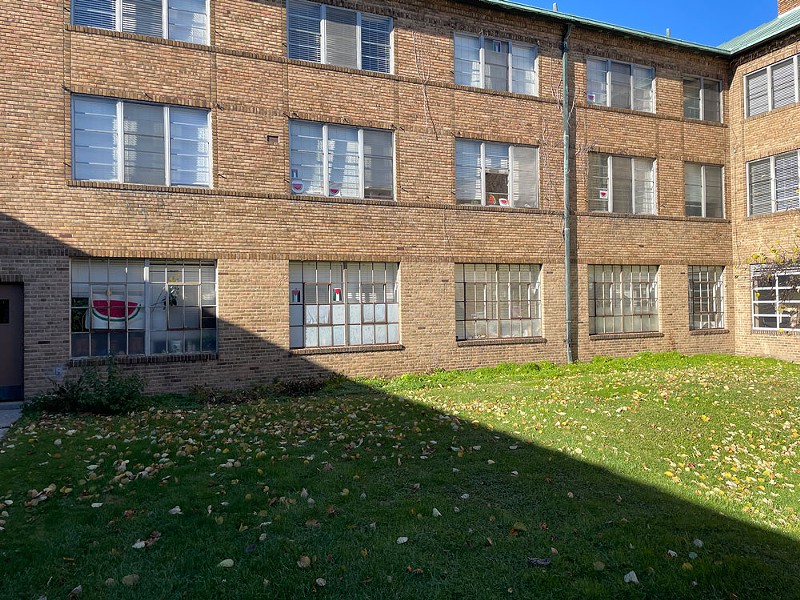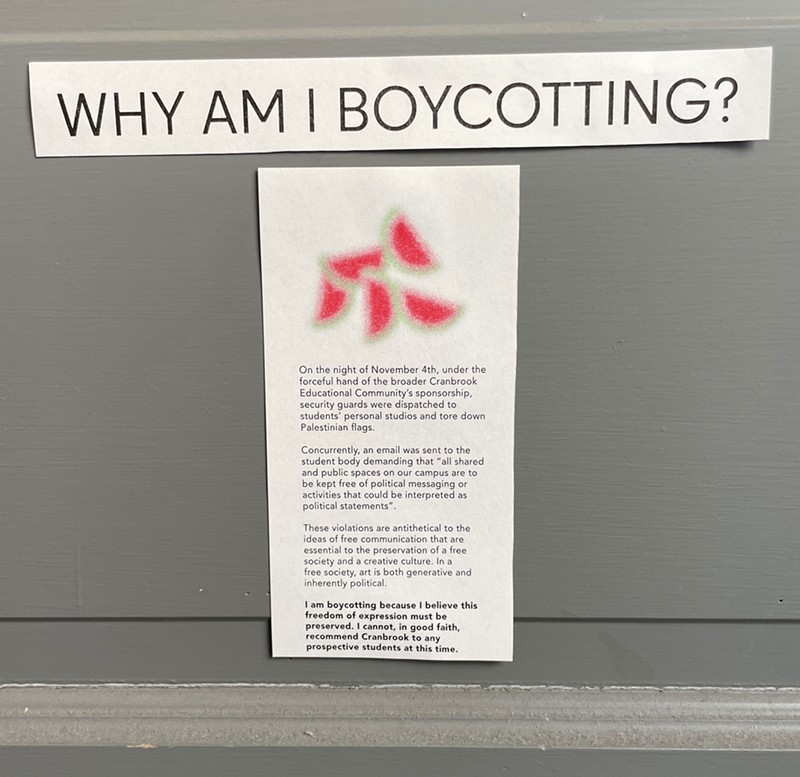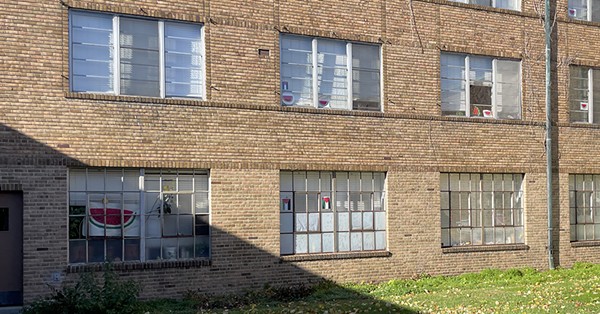
Courtesy of Ian Matchett
Cranbrook students put graphics of watermelons, which are used to show solidarity with Palestine, in their windows after Palestinian flags were removed by the academy.
Art has historically been used as a means of expression and political protest — but at Cranbrook Academy of Art, students and alumni feel they are being silenced.
The academy removed several Palestinian flags displayed in private studios and elsewhere on campus, leading students and alumni to rally against censorship.
Following an open letter to the university condemning the stifling of free speech and doubling down on support for Palestine signed by students and alumni, at least one artist was abruptly dropped from a Detroit gallery and accused of antisemitism. Paul Sacaridiz, the Maxine and Stuart Frankel Director of Cranbrook Academy of Art, has also resigned from his post.
It all started on the evening of November 4, when students say Cranbrook sent security officers to remove Palestinian flags from several studios and common areas. The academy later released a statement saying it does not allow political displays on campus.
“Given the collective size, scope, and positioning, based on our policies these displays were removed from the common spaces,” the statement read. “Institutionally, Cranbrook does not take a position on political causes, conflicts, or events, and it was our concern that these displays risked being interpreted as statements by Cranbrook. Our long-standing practice has been to keep our campus’ common areas free of political messaging or activities. We now understand that our timing and communication created confusion and undermined trust with members of our community.”
In the open letter to Cranbrook Academy with the support of alumni, students expressed their unwavering solidarity with the Palestinian people “in their eight decades of impassioned and fervent resistance for liberation against the settler colonial ideology of Zionism and the occupation of their land by the Israeli apartheid ethnostate.”
The students told Cranbrook that its position of neutrality is not shared by the people studying and creating on its campus.
“Cranbrook is making a choice to erase the Palestinian identity from public life, an explicitly political statement that betrays the plurality that the Academy allegedly champions,” the letter reads. “Supporting marginalized communities and standing in solidarity with liberation movements are fundamental to our rights to speech, expression, and creativity. The current stance taken by the Academy infringes on these rights, which are pivotal to academic freedom and resonate deeply with the broader global community. This campus is home to Black, Indigenous, and Brown students, people from the global South, diasporic students, and queer students whose liberation and freedom is contingent on decolonial struggle. Censoring our dissent against colonialism and genocide as artists, makers, and people, is a heinous act that disparages the relationships we’ve built here within our community. We have a vested interest in supporting Palestinian liberation because it liberates us too.”
Cranbrook Educational Community Chief Communications Officer Vijay Iyer confirmed to Metro Times that Paul Sacaridiz resigned from his position as the Director of the Cranbrook Academy of Art, effective November 8.
Students then staged a boycott during Cranbrook’s open house for prospective students on Saturday, November 11. “I cannot, in good faith recommend Cranbrook to any prospective students at this time,” the posters read, alongside graphics of watermelons. The fruit has been used to show solidarity with the Free Palestine movement because it bears the same colors as the Palestinian flag when cut open. Watermelons became a symbol of resistance after the Six-Day War in 1967 when Israel seized Gaza and the West Bank, and public displays of the Palestinian flag were banned by the Israeli government.
The boycott posters read:
“On the night of November 4th, under the forceful hand of the broader Cranbrook Educational Community’s sponsorship, security guards were dispatched to students’ personal studios and tore down Palestinian flags.
Concurrently, an email was sent to the student body demanding that ‘all shared and public spaces on our campus are to be kept free of political messaging or activities that could be interpreted as political statements.’
These violations are antithetical to the ideas of free communication that are essential to the preservation of a free society and a creative culture. In a free society, art is both generative and inherently political.
I am boycotting because I believe this freedom of expression must be preserved. I cannot, in good faith, recommend Cranbrook to any prospective students at this time.”
A student involved with the ongoing protest declined to speak to Metro Times on the record out of fear of retaliation, saying they needed time to figure out “how to properly navigate the situation at Cranbrook.”

Courtesy of Ian Matchett
During an open house on Saturday, November 11, students staged a boycott, leaving this message for prospective students.
They also told Metro Times Cranbrook’s student handbook prohibits them from speaking to the media. When we asked for clarification, Iyer told us “This is not specific to this situation. In general, our handbook asks faculty, staff, and students to refrain from speaking with media and refer journalists to our communications team. I understand this has been common practice across all of our entities on campus, not specific to the Art Academy.”
We don’t blame them for not wanting to speak publicly when artists are being labeled antisemitic for simply condemning genocide and ethnic cleansing. Israel’s attacks on Gaza have killed more than 11,000 Palestinian people, including more than 4,000 children, since the Oct. 7 attack by Hamas in which some 1,200 people were killed and more than 200 hostages were taken.
Caroline Del Giudice, a 2020 Cranbrook graduate with an MFA in sculpture, was dropped from David Klein Gallery after signing the open letter. She tells Metro Times over the phone she received an angry call from gallery owner David Klein as she was en route to one of the gallery’s openings.
“I was driving to his show to support my friends and support the gallery that I worked with and he tells me off immediately. He goes, ‘You ruined your art market. Don’t you know who your collectors are?’” Del Giudice says. “I’m an artist and educator and I want people to be able to express themselves. Cranbrook is constantly using me as an example on their social media of somebody who went to Cranbrook and I want them to do better. My reputation is directly linked with Cranbrook’s reputation.”
Shaken and upset over both Cranbrook and David Klein Gallery’s handling of the situation, Del Giudice emphasizes the genocide taking place in Gaza should be top of mind, regardless of what happens to those who speak out against it.
“There are children dying, people whose lives are being destroyed, and now we’re in a fuss about people getting dropped from art galleries. What is going on?” she says. “It’s like, you know what, fuck all of this. I don’t need an art gallery. As long as I can wake up in the morning and I can go do my thing and make my artwork, I’m gonna be fine. I am not getting buried by a building as a casualty of war. I am not being forced to march hundreds of miles as a displaced person. I’m all right.”
Another source close to the matter, who asked to remain anonymous, tells Metro Times art collectors have been circulating the open letter with the names of artists who signed it to local galleries.
“I don’t know if it’s collectors that are just so enraged or they’re people that work with Cranbrook Art Academy so they feel like they have some kind of ownership over what’s happening there,” they say. “For whatever reason, they’re donors, they’ve been longtime supporters, whatever, and they’re, they seriously are sabotaging [artists].”
Representatives for David Klein Gallery did not respond to our requests for comment.
Cranbrook released another statement on November 10 from Cranbrook Educational Community President Aimeclaire Roche that threatens to remove students from campus and “alert the appropriate authorities” if they continue to speak out in a manner the institution deems inappropriate.
“We will not tolerate activities nor language that disrupts our campus, threatens the safety of our community, or that violates policies or the code of conduct that governs student and community behavior,” it reads. It continues, “Let me be clear: we denounce – in the strongest terms possible – all forms of antisemitic, Islamophobic, racist, and hate-based discrimination and they have no place on our campus. It is important to note that we provide all of our students with opportunities to express themselves in a variety of ways, but they must do so in a manner that is respectful so that all those who set foot on our campus feel safe, welcome, and valued. We will take prompt and decisive action if this type of behavior or speech finds its way into our community, including removing the offender(s) and alerting the appropriate authorities, to protect our campus and to ensure accountability for such conduct.”
Iyer reinforced the academy’s stance to Metro Times via email, saying “Institutionally, we do not take a position on political causes, conflicts, or events. Our practice is to keep the common, shared areas of our campus free of messaging or activities, as displays of this nature could be interpreted as political statements made on behalf of Cranbrook. We take this approach because Cranbrook is a pluralistic and unique community, one that values and welcomes a variety of audiences, children and adult students, as well as residential faculty, staff, and their families — all with a myriad of national, religious, or personal affiliations.”
On Monday, Cranbrook decided to cancel its weekend events from November 17-19 including a photography alumni reunion and a memorial for former Artist in Residence and head of Cranbrook’s photography department Carl Toth. Toth passed away in 2022 and an exhibit of his work, Carl Toth: Reordering Fictions, is on view at the Cranbrook Art Museum.
Iyer said the academy will share updates on its leadership following Sacaridiz’s departure at a later date.
Subscribe to Metro Times newsletters.
Follow us: Google News | NewsBreak | Reddit | Instagram | Facebook | Twitter

